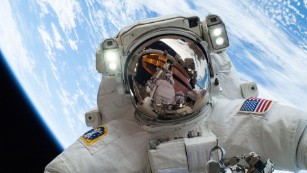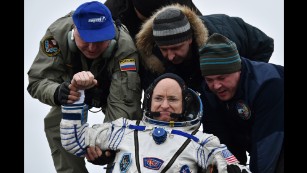This is your brain in space
May 26, 2016
(CNN) Let's imagine NASA has everything it needs to send a crew to Mars. The space agency's experts have figured out how to provide housing, food, water and air for the entire mission.
There still is one very important problem remaining: the people.
"These deep space missions ... they're isolated, they're confined, they're extreme-environment missions," NASA psychologist Lauren Leveton (PDF) told CNN's Rachel Crane. The crew will experience "an unprecedented distance, unprecedented duration and unprecedented confinement."
And most people really don't like being confined to small places for long periods of time (ask any airline passenger in the middle economy seat). They also don't like being away from loved ones (ask any soldier). Or having their days and nights scrambled (as anyone who has worked overnights). Or cranky co-workers (ask anyone!).
All of those things will happen to the people selected for the journey to Mars.
NASA is trying to solve the problems with its Behavioral Health and Performance program (PDF), which focuses on three risks for long missions. (Spoiler alert: They're similar to problems workers face here on Earth.)
No. 1 is what Leveton calls the "B-med risk": "adverse cognitive or behavioral conditions that could arise." In other words, the risk that a crew member will freak out and do something crazy.
Risk two: bad teamwork. This is when crew members make errors because they don't get along with each other.
Risk three: sleep. That's right, of all the things NASA has to worry about for a Mars mission, making sure everyone gets their Z's is a big priority. Lack of sleep raises the risk of making mistakes due to fatigue, just like on Earth.
NASA is using "analogues" -- comparable situations on Earth -- to study solutions.
One analogue is the Human Exploration Research Analog, a habitat where people are isolated for weeks at a time.
Another is HI-SEAS, short for Hawaii Space Exploration Analog and Simulation. Scientists volunteered to live in a habitat atop Hawaii's Mauna Loa volcano for eight months to see how the isolation would affect them.
Participant Neil Scheibelhut told Crane it was toughest around the holidays. "To be isolated and no contact, during the holidays ... that got to me, a little bit."
And what else did Scheibelhut learn?
"You have to be easygoing," he said. "Little things in life that normally don't bug you, bug you when you're around the same people for eight months."
Scheibelhut thinks a Mars mission -- for which the crew might be gone for four years -- would be very tough on relationships.
"You're just throwing away the life that you made. ... If you're married, like, who's gonna stay together for four years if your significant other is gone?"
He thinks the answer might be to send couples to Mars. (This might lead to a new type of astronaut: the couples therapist astronaut.)
Of course, if you send couples, you just might have sex. Scheibelhut hinted at this when asked how the HI-SEAS participants handled intimacy: "Yes, there are urges, and yes, people act on urges."
But after eight months locked up with the same people, does Scheibelhut think a Mars mission is doable? "Oh, sure."
The reason he's sure? Because the crew will be focused on exploring a new world. They'll be thinking, "I wanna go out and explore Mars. I wanna put my feet




No comments:
Post a Comment